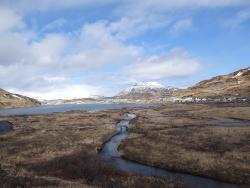Residents Ask City to Fix Lake, River Pollution

Monday, October 06 2014
The Unalaska Lake watershed is prime spawning ground for salmon in the heart of the city’s historic downtown. It’s also some of the least healthy habitat in the Aleutian Islands. Now, the city has a $1 million grant to clean it up -- but as KUCB's Annie Ropeik reports, residents are worried they’ll spend it on the wrong issues.
Subsistence users had a chance to weigh in on the watershed’s problems at a meeting with the city and its engineering consultants last week. The engineers said years of runoff from city snow removal and gravel roads has clogged the lake with silt.
They also pointed to old skiffs left on the banks of the Iliuliuk River, and said fishermen had trampled the wetlands along where salmon swim out to sea. That rankled high school science teacher Steven Gregory.
"Don’t be misled by that. There is no damage to the streamside vegetation," he told the rest of the audience at the meeting. "What we need to do is take measures to protect the spawning habitat."
Other longtime locals like Suzi Golodoff agreed that subsistence users weren’t the problem.
"The city and the landowners have got to step up to the plate, because -- here you guys are picking on us little guys with our skiffs, and it just kind of amazes me, to be frank," she said. "We try to keep it neat down there, and yes, it needs to be cleaned up, and we do an annual cleanup around town, but -- we keep encouraging more and more development, and pretty soon, we’re not going to have salmon."
She and others pointed to the privately-owned rock quarry at the head of the watershed, and other city developments they say have impacted wetlands. And they urged the city to be smart in doling out the grant money. It fell to Unalaska when the state’s coastal zone management authority ended in 2011.
A third of it is to restore the river, with the rest going toward stormwater mitigation at the lake. And the city will have to pick three or four specific projects for the grant: anything from silt traps, to an ordinance about runoff.
They could also use it to install a fish weir in the Iliuliuk River. Without one, there’s no hard data on how the sockeye run’s declined.
Members of the Unalaska Native Fishermen’s Association, like Vince Tutiakoff, said they’d help pay for river cleanup if it would free up money for the weir.
"This time of year, that creek would be boiling with salmon. Even though they’re starting to die off, you look down there now, there’s very few on the banks like there were 10, 12 years ago," Tutiakoff said. "So we’d like to see that further enhanced and get it cleaned up."
Residents agreed overwhelmingly that the river money should go toward a weir, which would also help show whether overfishing is part of the problem. Still, it's not clear how much one would cost. And city natural resources analyst Frank Kelty said it won’t be a simple process to install it.
"It’s nice to hear other organizations would step up to participate," he said. "But you still have to have the involvement of Fish & Game or some other entity where the data that’s received is taken care of properly."
What’s more, agencies from Alaska's Department of Fish & Game on up to the U.S. Army Corps of Engineers will have to issue permits for almost anything the city could buy with the grant. That can take years -- and the city has to use the money by 2016.
But residents’ concerns went beyond the scope of the grant. They say it’s the city’s push for development that’s harmed the lake. And city manager Chris Hladick said after the meeting that’s not a problem he can solve with just a million dollars.
"We realize that the money isn’t going to be a huge amount ... so the planning effort is really important for the long-term," he says. "We’re heightening this issue to another level to let contractors or whatever know, hey, we’ve gotta get our act together."
Hladick’s hoping the grant will spur some planning for stormwater management that the city should have done years ago. But he argues that subsistence users are having an impact, too.
"I don’t know how you look at one without the other," he says. "The whole issue with the siltation is salmon, so -- there used to be a stronger run of sockeye in the river, and it just gives you a goal to shoot for, I think."
Residents may disagree on how the blame gets shared -- but in the end, Unalaska’s city council will decide how to use their grant money. That’ll happen later this year, after public comment on all the options ends Oct. 15.



